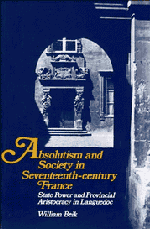 Absolutism and Society in Seventeenth-Century France
Absolutism and Society in Seventeenth-Century France Published online by Cambridge University Press: 05 July 2011
Insinuating themselves among the long-established governing institutions of the province were the royal agents. Their attentions were devoted to enacting the king's program directly and expeditiously, as compared to other authorities who might view themselves as equally loyal to the king and state, but who would nevertheless filter the royal wishes through an interpretive screen of corporate, provincial, and private considerations. There was nothing new about having direct agents of the crown in the province, either in the form of envoys sent out to reside for a time and oversee some particular business, or as resident natives who sought personal advancement by serving the king's interests. Both had existed for centuries. Even in the heyday of royal power the intendant was never the solitary commissar of the textbooks, enacting authoritarian state policy in the midst of a hostile population. Nevertheless, as all commentators have pointed out, the years after 1630 did represent a turning point in that the official intendants de justice, police et finances did reside longer, do more, and have much greater impact than their predecessors.
They were still supplemented by many other agents. There were temporary royal commissioners who came and went according to the rhythm of business, the military commanders, and various local residents – prelates, robe officers, even merchants – who served the king consistently enough to be considered agents, despite their provincial roots.
To save this book to your Kindle, first ensure [email protected] is added to your Approved Personal Document E-mail List under your Personal Document Settings on the Manage Your Content and Devices page of your Amazon account. Then enter the ‘name’ part of your Kindle email address below. Find out more about saving to your Kindle.
Note you can select to save to either the @free.kindle.com or @kindle.com variations. ‘@free.kindle.com’ emails are free but can only be saved to your device when it is connected to wi-fi. ‘@kindle.com’ emails can be delivered even when you are not connected to wi-fi, but note that service fees apply.
Find out more about the Kindle Personal Document Service.
To save content items to your account, please confirm that you agree to abide by our usage policies. If this is the first time you use this feature, you will be asked to authorise Cambridge Core to connect with your account. Find out more about saving content to Dropbox.
To save content items to your account, please confirm that you agree to abide by our usage policies. If this is the first time you use this feature, you will be asked to authorise Cambridge Core to connect with your account. Find out more about saving content to Google Drive.